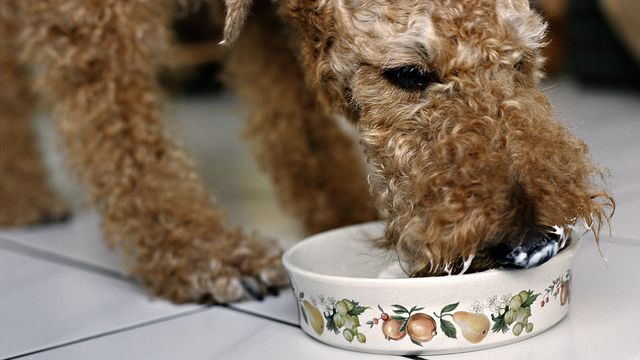Can a dog drink milk from the cow, yes or no? The answer is yes. However, only in moderation, and should allergic reactions to certain ingredients of the milk occur, you should no longer give the drink.
Cow’s milk contains a variety of different proteins, carbohydrates, fats, cholesterol, vitamins, and minerals. It is by no means poisonous to dogs, but it can still cause certain ailments, which we will discuss later. Therefore, as with humans, the following applies: only drink milk in moderation!
Milk is safe to enjoy in small quantities. A few tablespoons of cow’s milk on certain occasions is nothing wrong with a balanced diet. However, too much of the white drink can cause undesirable side effects such as acute diarrhea and vomiting. Too much fresher or homogenized milk for too long can also lead to obesity.
Can Puppies Drink Milk?

Breast milk is only an important source of nutrients for newborn puppies. Puppies need their mother’s milk even more than human babies. However, the dog’s milk contains more proteins and calories than conventional cow’s milk and is easier for the puppy to digest. Dog milk also contains a substance called colostrum, which helps boost the puppy’s immune system. Newborn puppies do not have any adverse reactions to breast milk, as it contains less lactose than cow’s milk.
Why is Cow’s Milk Bad for Dogs?
With a balanced dog diet, a dog gets everything it needs. Adult dogs do not need more than what is served in their feeding bowl every day. Dog food should always be matched to the size of the dog, its breed, and its gender. Additional, often superfluous, feed is therefore unnecessary. In addition, the consumption of food produced for humans – such as cow’s milk – can have undesirable consequences for the dog.
Milk Allergies
Dairy products such as cheese or yogurt contain proteins that are believed to cause allergic reactions in dogs. Unfortunately, many masters feed these foods with these foods as a kind of reward.
If you regularly give your dog cow’s milk and show the following symptoms, you must consider a milk allergy:
- Itching of the ears and paws;
- Chronic or recurring inflammation of the ears and skin;
- Vomiting, diarrhea, and severe gas.
Although treatments for allergies are available after the cause is known, it is primarily the inflammation on the skin that pet owners should be concerned about. Severe scratching leads to inflammation and further infections, which can usually only be treated with antibiotics.
Lactose
Lactose is milk sugar. In order for non-ruminant organisms to ingest it, it must first be broken down into its individual parts. However, dogs do not have this ability. This is why dogs often become lactose intolerant because the lactose they consume is not processed in the stomach and leads to inflammation.
Many dogs are therefore considered to be lactose intolerant. Dog owners need to be aware of this fact before feeding dairy products. Cheese and yogurt are usually easier to digest than cow’s milk, but they also contain problematic lactose.
Symptoms of lactose intolerance in dogs include:
- stomach pain;
- diarrhea;
- flatulence;
- vomit.
If your dog has one or more symptoms, consider alternatives to milk and dairy products.
Fats
Fats are very important to dogs. His body goes to the fat reserves even before it uses proteins and carbohydrates for energy. Dogs draw twice as much energy as fat as the other two macronutrients. In addition, a dog needs fat to live, because several vital processes depend on the processing of fatty acids.
As a rule, the dog absorbs all of the important fats through the dog food. If you overdo it with the feeding of fats, you risk obesity in your dog. This in turn can lead to a whole range of other health conditions such as pancreatitis, diabetes, or joint inflammation.
Summary
- Cow’s milk is not poisonous for dogs, but it and other dairy products pose a problem for dogs with lactose intolerance. If you feed too much milk too often, you risk your dog gaining weight and even becoming overweight.
- Goat milk with a lower percentage of lactose is an alternative.
Unsweetened plant-based milk such as almond milk or soy milk can cause allergic reactions. - If in doubt, you should not give the dog any milk or only in very small quantities. A well-fed dog already has all the nutrients and minerals in its normal food. There are more sensible alternatives to rewarding the dog than milk.

